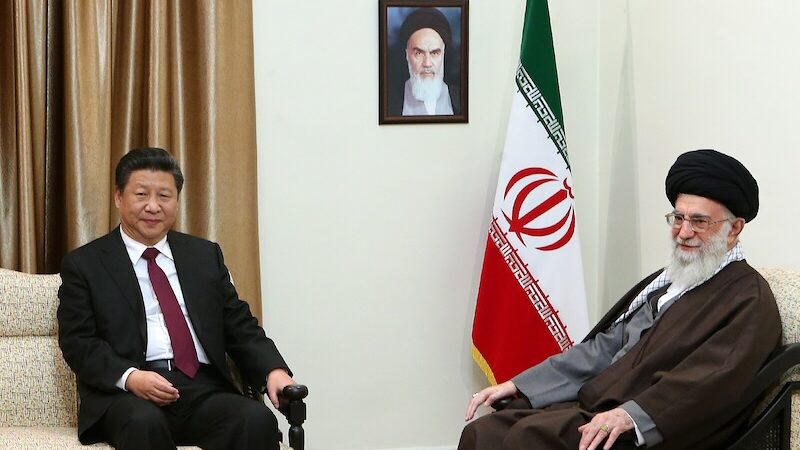The Shifting Sands: China Capitalizes On America's Stalled Middle East Policy

Welcome to your ultimate source for breaking news, trending updates, and in-depth stories from around the world. Whether it's politics, technology, entertainment, sports, or lifestyle, we bring you real-time updates that keep you informed and ahead of the curve.
Our team works tirelessly to ensure you never miss a moment. From the latest developments in global events to the most talked-about topics on social media, our news platform is designed to deliver accurate and timely information, all in one place.
Stay in the know and join thousands of readers who trust us for reliable, up-to-date content. Explore our expertly curated articles and dive deeper into the stories that matter to you. Visit Best Website now and be part of the conversation. Don't miss out on the headlines that shape our world!
Table of Contents
The Shifting Sands: China Capitalizes on America's Stalled Middle East Policy
The Middle East, a region historically dominated by American influence, is witnessing a dramatic shift in its geopolitical landscape. As the United States grapples with domestic challenges and a perceived retreat from its traditional role as a regional arbiter, China is strategically stepping into the vacuum, forging deeper economic and political ties across the region. This proactive approach is not just about seizing opportunities; it reflects a broader ambition to reshape the global order.
America's Retreat and the Rise of Chinese Influence:
For decades, the United States played a pivotal role in Middle Eastern affairs, heavily involved in conflicts, mediating disputes, and shaping regional alliances. However, recent years have seen a noticeable decline in American engagement. The costly wars in Iraq and Afghanistan, coupled with domestic political polarization, have led to a reassessment of American foreign policy priorities. This "pivot" has inadvertently created space for other global players, most notably China, to expand their influence.
The consequences of this shift are multifaceted:
-
Economic Investment: China's Belt and Road Initiative (BRI) has significantly impacted the Middle East. Massive infrastructure projects, ranging from ports and railways to energy pipelines, are transforming regional connectivity and bolstering China's economic leverage. This investment isn't merely about economic gain; it’s a strategic play to secure vital resources and solidify geopolitical partnerships.
-
Energy Security: China, a major energy consumer, is actively securing access to Middle Eastern oil and gas reserves. This strategic approach reduces reliance on other suppliers and strengthens its energy security, a crucial element of national power. Deals with major oil-producing nations are becoming increasingly common.
-
Political Engagement: China's approach prioritizes non-interference in internal affairs, a stark contrast to the often interventionist policies of the United States. This strategy has proven appealing to several Middle Eastern governments wary of Western influence. This non-interventionist approach allows China to cultivate relationships across a broad spectrum of countries, regardless of their political systems.
-
Technological Partnerships: China is actively sharing its technological advancements with Middle Eastern nations, particularly in areas such as 5G infrastructure and artificial intelligence. These partnerships offer Middle Eastern countries access to cutting-edge technology while strengthening China's technological dominance on the global stage.
The Implications for the Future:
The rise of Chinese influence in the Middle East is not without its challenges. Concerns remain regarding China's human rights record and its opaque business practices. However, the sheer scale of Chinese investment and its willingness to engage with various actors make it a powerful force shaping the region's future.
Navigating the New Geopolitical Landscape:
The changing dynamics in the Middle East require a nuanced understanding of the competing interests and power plays at stake. While the US continues to maintain a significant military presence and strategic relationships, the growing influence of China presents a new paradigm for regional stability and global power dynamics.
Conclusion:
The Middle East is undergoing a profound transformation. China's strategic engagement, fueled by America's relative withdrawal, is reshaping the geopolitical landscape. Understanding this shifting power dynamic is crucial for anyone seeking to navigate the complexities of this volatile and strategically important region. The coming years will be pivotal in determining the long-term consequences of this evolving relationship. What remains certain is that the sands of the Middle East continue to shift, creating both opportunities and challenges for global powers.

Thank you for visiting our website, your trusted source for the latest updates and in-depth coverage on The Shifting Sands: China Capitalizes On America's Stalled Middle East Policy. We're committed to keeping you informed with timely and accurate information to meet your curiosity and needs.
If you have any questions, suggestions, or feedback, we'd love to hear from you. Your insights are valuable to us and help us improve to serve you better. Feel free to reach out through our contact page.
Don't forget to bookmark our website and check back regularly for the latest headlines and trending topics. See you next time, and thank you for being part of our growing community!
Featured Posts
-
 Sir Ed Davey Suggests 10 000 Incentive For Army Recruits
Jun 23, 2025
Sir Ed Davey Suggests 10 000 Incentive For Army Recruits
Jun 23, 2025 -
 Need A Break Cnn Games Offer Instant Relaxation
Jun 23, 2025
Need A Break Cnn Games Offer Instant Relaxation
Jun 23, 2025 -
 Palestine Action Faces Bbc Ban Member Calls Plan Absurd
Jun 23, 2025
Palestine Action Faces Bbc Ban Member Calls Plan Absurd
Jun 23, 2025 -
 Five Realistic Paths To An Nba Championship For The Oklahoma City Thunder
Jun 23, 2025
Five Realistic Paths To An Nba Championship For The Oklahoma City Thunder
Jun 23, 2025 -
 Celebrities Speak Out The Untold Story Of Tattle Life And Its Impact
Jun 23, 2025
Celebrities Speak Out The Untold Story Of Tattle Life And Its Impact
Jun 23, 2025
Latest Posts
-
 Oklahoma City Thunder Fans Pack Watch Parties For Crucial Game 7
Jun 23, 2025
Oklahoma City Thunder Fans Pack Watch Parties For Crucial Game 7
Jun 23, 2025 -
 Warning Protect Yourself From Dating App Scammers
Jun 23, 2025
Warning Protect Yourself From Dating App Scammers
Jun 23, 2025 -
 Absurd Palestine Action Member Rejects Proposed Bbc Ban
Jun 23, 2025
Absurd Palestine Action Member Rejects Proposed Bbc Ban
Jun 23, 2025 -
 Sheppards Strategic Thinking Key To Pacers Game 7 Success
Jun 23, 2025
Sheppards Strategic Thinking Key To Pacers Game 7 Success
Jun 23, 2025 -
 Thunder Game 7 Early Birds Flock To Oklahoma City Watch Parties
Jun 23, 2025
Thunder Game 7 Early Birds Flock To Oklahoma City Watch Parties
Jun 23, 2025
